
This story was updated on July 30, 2024.
For the third year in a row, Michigan State University is among 28 educational institutions across the country to provide a leadership institute for the Mandela Washington Fellowship for Young African Leaders. Twenty-five fellows from 18 different African countries arrived in Michigan June 19 for the six-week leadership program.
Sponsored by the U.S. Department of State and hosted by MSU’s Alliance for African Partnership and the Department for Global Studies in the Arts and Humanities, MSU Leadership in Civic Engagement focuses on effective advocacy through an integrated and interactive program that aligns with five major themes.
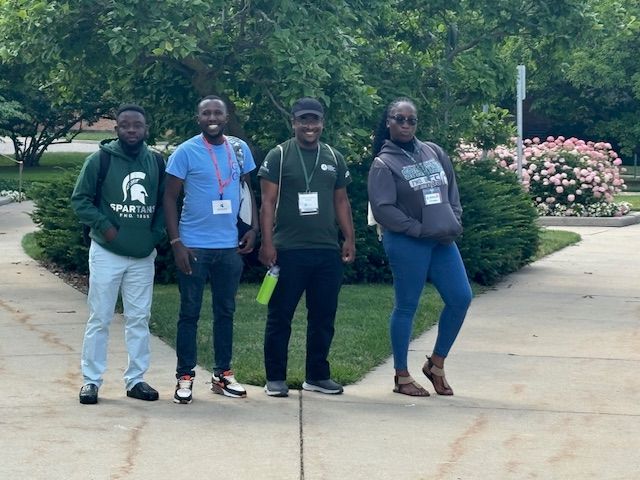
“The 2024 Mandela Washington Fellows are a remarkable group of creative and motivated individuals who bestowed their gifts on our campus and the greater Lansing area,” said Salah Hassan, academic director of the fellowship, associate professor in the Department of English and director of Global Studies in the Arts and Humanities.
Beginning with the principles of civic engagement and storytelling, fellows explore the meaning and foundations of civic engagement and the role of stories in building community.
“I’ve learned that telling a story is also about allowing others to project themselves into your reality,” said Samantha Bickini, a Mandela Fellow from Republic of Congo now living in Senegal.
“Exchanging with people from different backgrounds, with different experiences, taught me to shape a strong story, centered on people and the world around them,” said Bickini, who is the regional digital officer at the International Committee of the Red Cross and a blogger for Mondoblog, the largest platform for French-speaking bloggers.
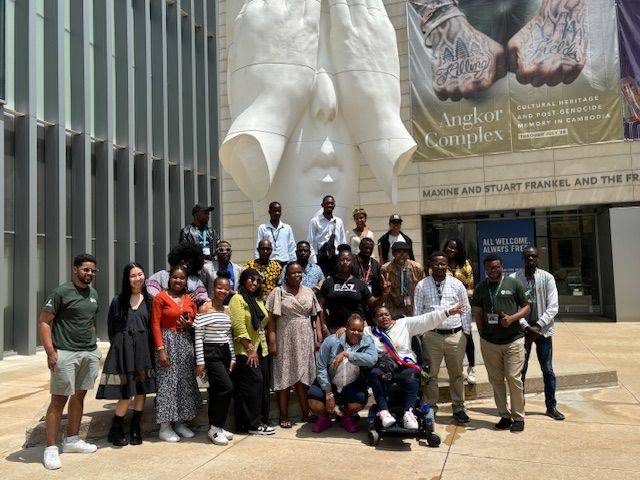
The Institute’s ambitious itinerary includes a combination of academic sessions, site visits, leadership training, community service, cultural and social activities, and networking opportunities.
For Mandela Fellow Thuthula Sodumo, a disability rights and gender equality activist from South Africa, the sessions with Upenyu Majee, MSU’s inaugural director of the Institute of Ubuntu Thought and Practice, were among the most helpful.
“I truly believe in the power of Ubuntu and how it can transform communities and give opportunities to people who wouldn’t otherwise have access by virtue of their social standing,” Sodumo said.
“After my accident, my village became an integral part of my healing. Through Ubuntu, the collective compassion and care of my community helped me overcome challenges and find strength. It was this shared humanity that enabled me to heal and grow.”
Sodumo, who uses a wheelchair, plans to establish an organization that will empower rural girls with disabilities.
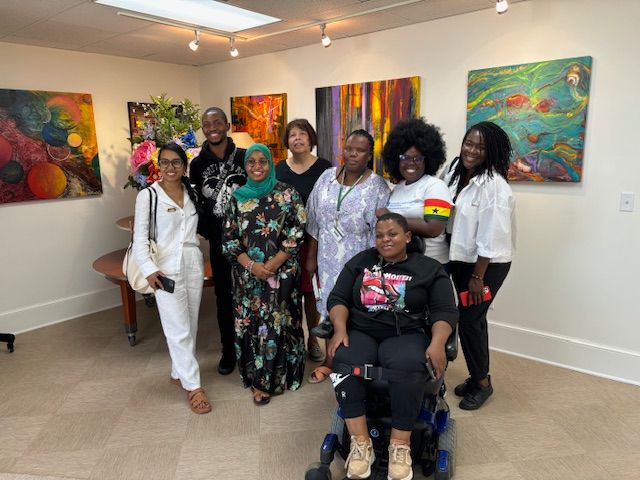
Another component of the Leadership Institute is one-on-one professional coaching with MSU faculty, staff and local community leaders. Fellows are matched with a Focus Project Coach to help guide them as they further develop individual projects designed to serve the communities in their home countries.
“I was lucky enough to have the perfect match with my coach — the kind of match I’d like to establish with my project,” said Bickini who is creating a digital platform that matches young African women beginning their careers with professional women who have expertise and experience navigating the workforce.
“The great advantage of having a coach is that I feel supported, accompanied and understood. I know I’ll always be able to call on my coach for help and draw on her experience. That’s priceless,” Bickini said.
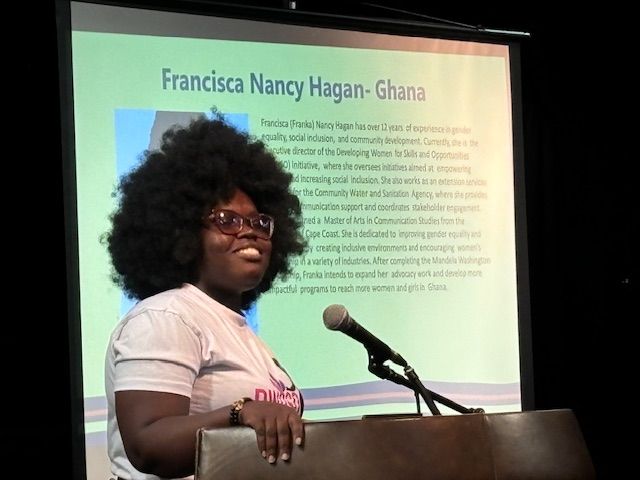
In addition to coaching, the Leadership Institute provides a variety of resources to support fellows as they prepare presentations about their projects, including delivering an IGNITE talk and designing a project poster.
Godfrey Kambewa, a Mandela Fellow from Malawi and executive director of the Angaza Foundation, will represent the MSU Mandela Fellows at the Mandela Washington Fellowship Summit in Washington D.C. July 29-31 when he gives his IGNITE talk about expanding the Angaza Foundation and other community-led networks that serve Malawi’s most vulnerable people.
The Leadership Institute celebrated the conclusion of this year's program during the Closing Ceremony, July 24 in the Minskoff Pavilion. Keynote speakers included Titus Awokuse, associate dean of International Studies and Programs, and Yen-Hwei Lin, interim dean of the College of Arts and Letters.
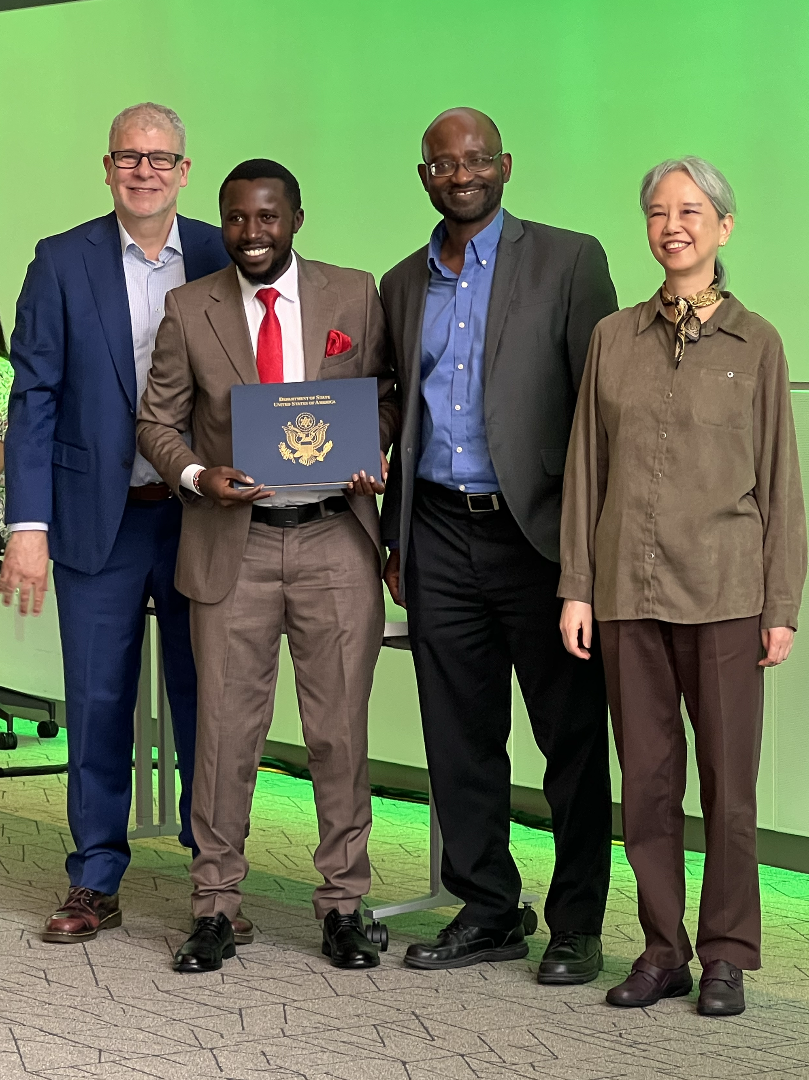
In addition to each fellow receiving a certificate of completion, program partners and facilitators provided remarks, a community art installation created by the fellows under the direction of local artist Zahrah Resh and MFA student Vadu Rodrigues was on display, and the short film "Threads of Africa" debuted.
"This year is especially significant as we celebrate the 10-year anniversary of the MWF Program, launched by President Obama in 2014," said Anjam Chaudhary, academic facilitator and director of Global DEI in International Studies and Programs.
"Serving a group of amazing African leaders with an exceptionally talented and supportive team has been a true privilege, changing me for the better in countless ways."
The Leadership Institute concludes this week with Fellows departing for Washington D.C. on July 28.
Photos courtesy of Salah Hassan.